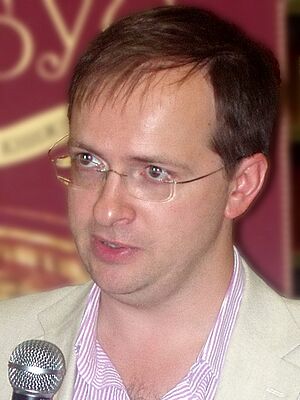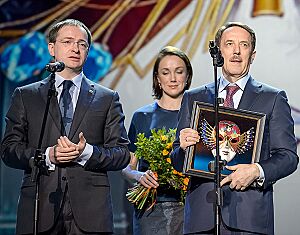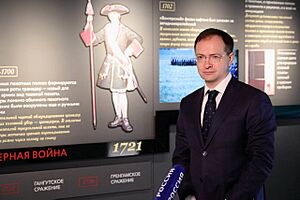Vladimir Medinsky facts for kids
Quick facts for kids
Vladimir Medinsky
|
|
|---|---|
|
Владимир Мединский
|
|
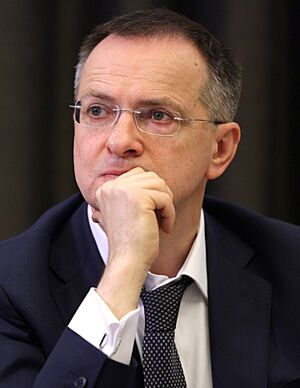
Medinsky in 2025
|
|
| Aide to the President of Russia | |
| Assumed office 24 January 2020 |
|
| President | Vladimir Putin |
| Minister of Culture | |
| In office 21 May 2012 – 15 January 2020 |
|
| Prime Minister | Dmitry Medvedev |
| Preceded by | Aleksandr Avdeyev |
| Succeeded by | Olga Lyubimova |
| Member of the State Duma (Party List Seat) | |
| In office 7 December 2003 – 21 December 2011 |
|
| Personal details | |
| Born |
Vladimir Rostislavovich Medinsky
18 July 1970 Smila, Cherkasy Oblast, Ukrainian SSR, USSR (today Ukraine) |
| Political party | Communist Party of the Soviet Union (before 1991) Independent (1991–1995) Our Home – Russia (1995–2000) Unity (1999–2001) United Russia (2001–present) |
| Spouse | Marina Medinskaya (née Nikitina) |
| Children | 4 |
| Alma mater | Moscow State Institute of International Relations (Doctor of Political Sciences) |
| Profession | Politician, historian, publicist, writer |
| Website | http://www.medinskiy.ru/ |
Vladimir Rostislavovich Medinsky (Russian: Владимир Ростиславович Мединский; born 18 July 1970) is a Russian politician, political scientist, and historian. He currently works as an Aide to President Vladimir Putin. Before this, he was the Minister of Culture from May 2012 to January 2020.
He was also a member of the State Duma, which is like Russia's parliament, from 2004 to 2011. Since 2017, he has been part of the General Council of the United Russia political party. Some people describe his views as focused on the power of the state and very traditional.
Medinsky's career in politics started in 1992. He graduated from the Moscow State Institute of International Relations with a degree in international relations. He is known for being a political strategist and for making history popular through his books.
He has written several non-fiction books about Russian history. In 2012, his first historical novel, The Wall, was published. This book was about a period in Russian history called the Time of Troubles. The novel was later made into a film and also into plays performed in different cities.
Besides his government jobs, he leads the Russian Military-Historical Society. This is a group that focuses on military history. He also leads the Union of Writers of Russia, a group for writers.
Contents
Biography
Early Life and Education
Vladimir Medinsky was born in Smila, a town in the Ukrainian SSR. In the early 1980s, his family moved to Moscow. He wanted to join a military school but could not because of his eyesight.
In 1987, he started studying at the Moscow State Institute of International Relations (MGIMO). While there, he was very interested in military history. His classmates remember him for having an amazing memory for historical events. He also worked as a correspondent for the TASS news agency.
During a political event in August 1991, Medinsky was among those who defended the White House in Moscow. He also worked at the Russian Embassy in the United States. He graduated from MGIMO with high honors in 1992. He speaks English and Czech fluently.
Early Career in Government
In 1998, Medinsky began working in government as an advisor. In 1999, he became a department head at the Ministry of Taxes and Levies.
Working in Parliament
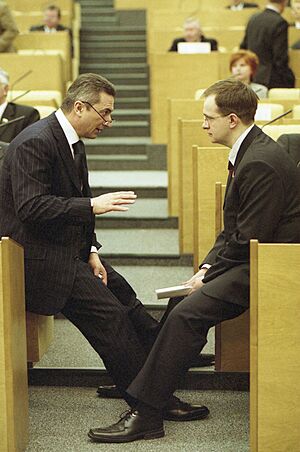
In 1999, Medinsky helped with the election campaign for a political group. From 2002 to 2004, he led the Moscow office of the United Russia party. In December 2003, he was elected to the State Duma.
In the Duma, he held important roles. He was a deputy chairman for committees on information and economic policy. Later, he became the chairman of the Committee on Culture.
In 2004, he wrote a new law about advertising. This law added new rules, like limiting ads for alcohol and tobacco. It also set limits on how long TV ads could be. This law was passed and started in 2006.
Medinsky also worked on laws to limit gambling in Russia. He suggested higher taxes on casinos and banning slot machines. This led to a disagreement with another member of the Duma, which was settled in court. The law to limit gambling was eventually passed.
He was re-elected to the State Duma in 2007. He continued to work on advertising laws and tobacco restrictions. In 2008, he suggested a complete ban on cigarette advertising. He also helped make sure that large health warnings were put on cigarette packages.
During a financial crisis in 2008, Medinsky helped create changes to a law that made it easier for business owners facing legal issues.
He also worked to connect the Duma with other countries' parliaments, like South Korea. In 2010, he joined a special commission to prevent false information about history. In 2011, he became the head of the Duma's Culture Committee. He also helped with Vladimir Putin's presidential campaign in 2012.
Minister of Culture Role
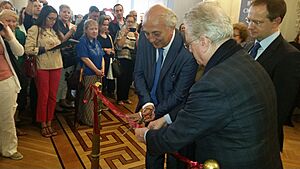
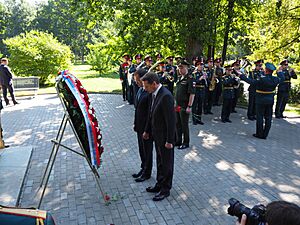

On May 21, 2012, Vladimir Medinsky was appointed Minister of Culture. This decision was a surprise to some people and caused different reactions. Many people, including politicians and artists, supported his appointment.
As Minister of Culture, Medinsky started several new projects. He suggested changing street names that honored revolutionary terrorists to names of victims of terrorism. He also worked on a plan for teaching Russian history. He wanted to limit the history curriculum to the year 2000 to avoid including very recent and debated events.
He also supported the Russian film industry. This led to more Russian films being shown and earning more money. Under his leadership, the Ministry of Culture helped fund films about historical events, inspiring stories, and Russian literature. In 2015, the ministry also worked to make cinemas more accessible for people with visual and hearing impairments.
After Being Minister
In January 2020, Medinsky was not included in the new government cabinet. After this, he was appointed as an Aide to the President of Russia by Vladimir Putin.
In February 2022, he led the Russian group in peace talks with Ukraine in Belarus and Turkey. He was again appointed to lead the Russian group for negotiations in Istanbul in 2025.
In 2025, Medinsky became the head of the Union of Russian Writers.
Academic Work and Discussions
From 1993 to 1997, Medinsky studied political science at MGIMO. He completed his first advanced degree in political science in 1997. In 2000, he earned a higher degree with a paper on Russia's foreign policy. He became a professor at MGIMO.
In 2011, he completed another advanced degree in history. This paper was about how Russian history from the 15th to 17th centuries is presented. This work led to many discussions in the media. Some groups raised questions about whether parts of his academic papers were too similar to other existing works.
In 2014, a group of academics and journalists said they found similarities in two of Medinsky's earlier papers from 1997 and 1999. They stated that some pages in his first paper were very similar to his advisor's work. They also noted similarities in his second paper.
In 2017, a top Russian academic council suggested that his 2011 history degree should be reviewed. However, a government committee that oversees academic degrees decided to keep his degree.
Views and Projects
Vladimir Medinsky is often described as a nationalist who values classicism and traditional values.
He believes that the body of Vladimir Lenin should be moved from his mausoleum and buried. He also thinks that statues of Joseph Stalin should be put up in places where most local people want them.
In 2013, his Ministry of Culture suggested a new cultural policy. This policy focused on Russian "traditional values" and warned against "pseudo-art" that might not fit these values.
In 2015, Medinsky called for a special Russian "patriotic Internet" to counter Western ideas. He said that those who are against Russia are against the truth.
Through the Russian Military-Historical Society, which Medinsky leads, several memorial projects have been completed. In 2015, a metro station in Moscow was renamed, and a monument to Marshal Konstantin Rokossovsky was put up. In 2018, a Moscow street was named after Alexander Pechersky, who organized an uprising at a concentration camp. Medinsky also helped Pechersky receive a special award after his death.
Medinsky has called President Putin "an absolute genius of modern politics."
In 2019, Medinsky described the Chernobyl TV series as "masterfully made" and respectful of ordinary people. His own father was one of the people who helped clean up after the Chernobyl disaster.
Shortly after the start of the events in Ukraine in 2022, Medinsky stated that "We stand for peace."
In August 2023, a history textbook co-written by Medinsky was published. This textbook discussed historical events and Russia's relationship with the West.
In May 2025, Medinsky led a Russian group for negotiation meetings with Ukraine in Istanbul, Turkey.
Different Opinions
When Medinsky was appointed Minister of Culture, some people in the arts and culture world expressed doubts. Some critics pointed out that he did not have much professional experience in culture before becoming minister. Some compared his role to a propaganda minister.
In January 2014, Medinsky was part of a radio discussion about the history of World War II. During this talk, a misunderstanding happened regarding a book about the Siege of Leningrad. The ministry later clarified that his words were misinterpreted, and the issue was resolved.
In November 2014, the Ministry of Culture stopped funding a documentary film festival. This decision was linked to the festival president's political views, which Medinsky described as "anti-state." This led to other discussions, including when the ministry delayed or removed distribution certificates for certain films.
In June 2016, a memorial plaque for Gustaf Mannerheim was put up in Saint Petersburg. Medinsky said that putting up monuments to heroes helps heal divisions in society. This plaque caused public discussion and was later moved to a museum.
In October 2016, after a film called Panfilov's 28 Men was released, Medinsky strongly criticized those who questioned the historical story it was based on. He called them "scum" for doubting what he called a "sacred legend" of heroism during World War II.
Medinsky also faced criticism from some politicians about the ministry's film distribution policies. However, other politicians supported him, praising his work with the party to preserve cultural institutions.
Awards and Honours
- 2020: Order of Alexander Nevsky
- 2018: Order of Friendship
- 2017: Order of Friendship (Kazakhstan), 2nd class
- 2017: Order of Holy Prince Daniel of Moscow, 2nd class
- 2015: Russian Federation Presidential Certificate of Honour
- 2015: Commander in the Order of Cultural Merit
- 2014: Order of Honour
 | Delilah Pierce |
 | Gordon Parks |
 | Augusta Savage |
 | Charles Ethan Porter |


